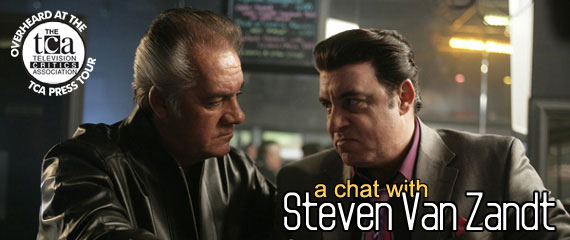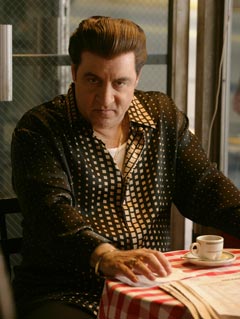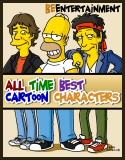
By Will Harris
08/14/2007
TV Home / Entertainment Channel / Bullz-Eye Home
(Caveat: As I turned on the recorder, Van Zandt was in the middle of answering a question about how his satellite radio show was doing.)
Steven Van Zandt: Sirius is a little more vague. It's harder to...the last I heard, they were up to six million subscribers. The advertising agencies, I'm hearing, are allowing them to count two people per subscriber, so it's somewhere between the six million and 12 million listeners, let's say. Our channel, the last time I looked, was around ... somewhere in the neighborhood of ... and none of these things are scientific, but around five percent. So I gotta figure it's right in that five, six hundred thousand area.
Reporter: That's not bad.
SVZ: No! It's just that, when you compare to twice that number for my syndicated show, it seems less...but it's still new. Sirius is still relatively new, and, hopefully, with the merger...
Reporter: Is it mostly people listening to Howard Stern on Sirius?
SVZ: He's got a big audience. I wouldn't say "mostly," but he certainly has...you gotta figure a couple million people came over and subscribed immediately when he came over. I don't know what that number would be. Three, four, five million? It could be as many as a third (of Sirius's subscribers). But I'm just guessing, though.
Reporter: Like you say, it's really in its infancy, and with stuff like satellite radio, iTunes, and the major labels being in such trouble, where do you see the future of the business going?
SVZ: Honestly, I wasn't kidding when I was talking about these (music-related video) games. For those of us who are a little bit older and didn't grow up with that gaming thing, it's a little harder for us to understand, perhaps, but this new game, "Rock Band"... are you familiar with that "Guitar Hero" game a little bit? You got nephews or something who play it? Well, it's like that, only this time it's drums, bass guitar and singing together. So it's really getting close to an actual rock band! (laughs) And kids are gonna hear...the reason why I took the job as chairman -- they're not paying me anything -- I'm doing it strictly because I think it's that important. This is how kids are gonna hear rock n' roll. They're gonna hear it through my show, maybe, through Sirius Satellite, some with "Seven Ages of Rock," on VH-1 Classic, which is a very, very important TV show, but some are gonna get it from games. They're gonna hear rock n' roll for the first time in the game they're playing. And Electronic Arts and some of these other companies are very, very hip to that. And it was really cool of MTV Games to come to me and say, "Listen, we want to make sure that every important era is covered in the game, as much as we can." And I think that's gonna be a big tool in their learning.
Reporter: Meanwhile, in terms of the old guard, I just read a story that Columbia is basically pinning its entire financial future on the new E Street Band album.
Bullz-Eye: No pressure there!
Reporter: Yeah, no pressure there! (laughs) But what do you think about that?
SVZ: I think, geez, we better make one! (laughs, then leans toward his assistant) Nicole, take a note: "Make a new E Street Band album." Wow. Uh, I think that might be a little bit exaggerated! They've got a couple of other people over there, y'know...guys like, uh, Dylan? But I think what is true in that statement is the fact that the older success stories -- and there aren't a whole lot left, but there are certainly a handful hanging around -- those are the ones who've become dependable and consistent and still sell records. Because, I guess, it's an older and -- let's face it -- a mostly older audience who still buy records and CDs. So in that sense, you can understand that the Springsteen fan or the Bob Dylan fan or the other guys who are still around and still making records -- maybe the Rolling Stones, or Tom Petty, or Jackson Browne, guys who made it through the '60s, '70s, and '80s -- I think those audiences grew up in the album era, and so they're still gonna buy albums. The biggest concern for everybody, and it's totally legit, is not even the delivery system of how a kid is gonna buy a record. That's not the biggest issue. It's going from albums to singles. We're back to 1962! And this is what nobody's quite registering. The entire industry as we know it is built on the fact that we became an album business somewhere around the Beatles. I mean, the Beatles' first album was really the first big album. And of course, by Sgt. Pepper, three years later, it was official that the album is the art form of the (medium), and all that. Well, then, the industry got built. It wasn't really an industry up until that point. It was a bunch of thieves and mob guys (laughs) and mom and pop stores. Just a couple of crazy guys who thought that teenage trends are gonna come and go. These guys, one minute they're having hits, the next minute they join the Army, the next minute they're marrying their 13-year-old cousin, y'know?
Bullz-Eye: Not to name names.
SVZ: Not to name names...even though I just did! (laughs) But you know what I'm saying? That's how the business was: you make a couple of bucks, you keep moving. It wasn't a long-term industry, built on longevity, until the Beatles hit. And, then, they kept evolving, and they didn't go away, at least, not for eight years! And it became albums that mattered. So, all of a sudden, 79 cents became four dollars...or more in some places, but whatever...and the industry was built on that. Well, that just came to an end. Now what? You've got an industry built on buying albums, and guess what? Nobody's buying albums! All right? So that's the collapse we're seeing. That's the chaos. That's the total panic that's going on, and it's totally legitimate.
Reporter: So can you trace this, then, to record companies making albums but issuing singles so that radio can play a specific song all the time, or do you trace it to radio being so narrow in its play lists, as far as competition goes?
SVZ: It's a lot of things, and it didn't quite happen overnight. Keep in mind that the "single selling the album" concept didn't happen for business reasons; it happened naturally. It was singles first, and then albums, and, in England, they didn't put the singles on the albums. Which is why America did three records for every two records in England. They'd put the singles on, the B-sides, grab two songs off the English album, and call it a new album! No greed involved there or anything! (grinning) It's purely for aesthetic reasons, I'm sure! But, so, that developed naturally, and then, all of a sudden, in America, we wanted the singles to be on the records, so we would buy the record twice. England wouldn't put the single on the album because they felt that, ethically, they shouldn't sell the same song twice. Wild concept, right, for business guys? In America, we had no problem with these ethics! But the truth was that kids wanted it. We would buy the single, then we would buy the album, and we wanted the single on there, too. So the single became a way of driving the albums, and, to some extent, I think maybe that's still true. It certainly hit its peak in the '80s when we, of all people, had seven top-10 hits. Seven top hits off of Born in the USA! That's...insane. You know what I mean? You look back, you hear Michael Jackson and you're hearing...who else was big? Prince...
An unidentified voice: Vanilla Ice.
 SVZ: Vanilla? (Does a double-take, then laughs when he realizes that the speaker is Vanilla Ice, who's sitting about five feet away, doing an interview for another program.) Yeah, so, there's Prince, there's Vanilla Ice (laughs again, pointing to Ice) and then you hear, like, "Working on the Highway," by Bruce Springsteen, and you're, like, "What the hell is that doing in the top 10?" It was just that time. The time was right, and, bam, we went from selling three million records, which we thought was about as many albums you could sell -- how are you ever gonna sell more than three million albums, right? -- to 20 million! So the "single driving the album" thing probably hit its peak in the '80s.
SVZ: Vanilla? (Does a double-take, then laughs when he realizes that the speaker is Vanilla Ice, who's sitting about five feet away, doing an interview for another program.) Yeah, so, there's Prince, there's Vanilla Ice (laughs again, pointing to Ice) and then you hear, like, "Working on the Highway," by Bruce Springsteen, and you're, like, "What the hell is that doing in the top 10?" It was just that time. The time was right, and, bam, we went from selling three million records, which we thought was about as many albums you could sell -- how are you ever gonna sell more than three million albums, right? -- to 20 million! So the "single driving the album" thing probably hit its peak in the '80s.
Reporter: And, plus, that was also the early days of MTV. I mean, how many times did I see Bruce Springsteen dancing with Courtney Cox in those days? I must've seen that video a million times.
SVZ: Yeah, I think that probably boosted sales, also. You're right. But, anyway, somewhere along the line, because of, I think, corporate mergers and things like that, the play lists started to shrink to their current point, and this was a really, really big mistake, because, now, you can't hear new rock n' roll. It's very hard. That's why we started "Underground Garage." You can hear new hip-hop, you can hear new hard rock, you can even hear new indie rock and new pop, but you can't hear new rock n' roll. If the Rolling Stones came out today, nobody could play them. Now, that's shocking, isn't it?
Reporter: And they're gonna sell less than a million records, which is pretty much what any new rock sells anymore. Half a million records or so, if they're lucky!
SVZ: Yeah, for us, we bring expectations way down for our new bands. Like, 20,000 is garage platinum! (laughs) It's just a really different world. It's a major, major...it's bigger than a paradigm shift. What we have here is a complete...
Reporter: It's completely seismic.
SVZ: It is. It's as big as whatever word -- I don't have words big enough for what's going on right now. It's changing every month! It's literally changing every month or two! So we'll see where things settle down. But I think...and I don't know the answer to the "singles vs. albums" thing, other than, in my record company, we're just gonna try and make great albums, like we used to, and not have filler. We're gonna try and make the albums 10 or 12 great songs and hope for the best. I'm hoping there's a trend eventually where vinyl comes back a little bit. It'll never come back in the sense that it can make any money, but even a few thousand copies of a vinyl record will at least preserve the records the way it's supposed to sound, number one, but, number two, the artwork, and number three, the aesthetics of that 12" record. That's one thing we're going to try to do with our record company, even if it's only a few thousand copies, just to keep that thing alive. The MP3 technology just continues to degrade this music, and I believe it's affecting us. I believe it's affecting the kids and their emotional response to the music. I actually believe that. Now, as the sampling rate improves, I hope that improves. My concern -- and I know I'm digressing here -- but my concern is, how are the archives being preserved? As journalists, you should look into this. I started to look into it a few years ago, and I did not like what I was finding. In other words, the older tapes, are they being preserved through digital, or are they being preserved in digital and in analogue? It's essential that they're preserved in analogue, because that digital rate, you're married to that forever, and as that sampling rate increases, we're going back to the master that was digitized at the wrong sampling rate. This is a major, major, major thing. It's like going back and having an edited version of Shakespeare as your master. So you should check into that.
Reporter: If I could just get in one "Sopranos" question before you go: where did you watch it, and did you know what was coming?
SVZ: You know...well, yeah, we had seen it. But we had a big event at the Hard Rock Casino, in Hollywood, Florida, and the whole cast went down -- or a big part of the cast -- and so we had an appearance there, and we all watched it together. So it was nice.
Reporter: And are we going to see you doing any acting coming up in the future?
SVZ: Well, we'll see. No plans at the moment, other than my little "Rocky Rialto" thing (his B-movie-loving alter ego), which you'll see. I wouldn't say that's exactly acting, but it's somewhere between me and acting, and I'm gonna have this other character do a few shows. As far as serious acting, though no, no plans. I gotta see what Bruce wants to do this year!








